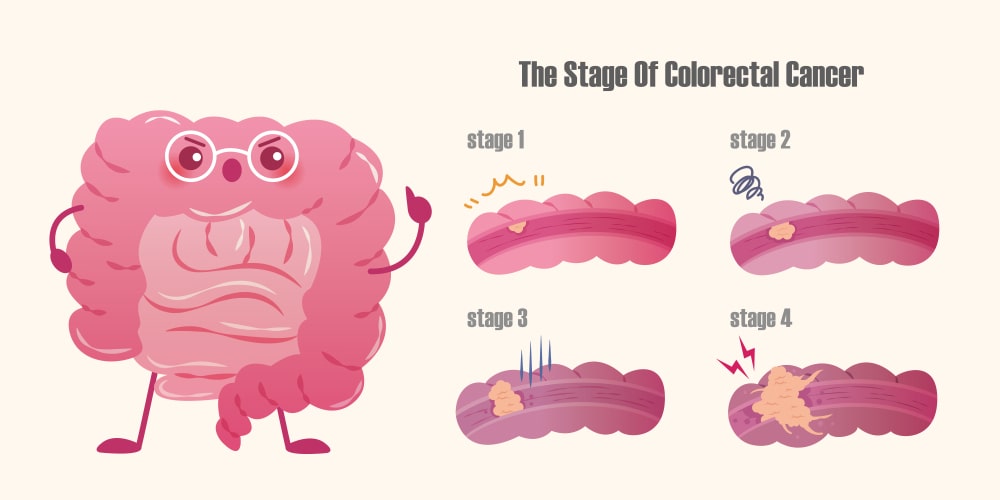Pioneer Woman: Understanding Stage 4 Colon Cancer
The term "Pioneer Woman" resonates deeply with many, but in recent years, it has taken on a more somber meaning due to the alarming rise in colon cancer cases. Stage 4 colon cancer, the last stage of the disease, represents a critical point where the cancer has spread to distant organs. This article will explore the implications of this diagnosis, focusing on the experiences and challenges faced by those affected, including the emotional and physical battles they endure. As we delve deeper into this topic, we aim to provide valuable insights, backed by expert opinions and statistical data, to raise awareness and foster a deeper understanding of colon cancer.
Colon cancer is one of the most common types of cancer, and its impact stretches far beyond the individual diagnosed. Families and communities are often left grappling with the consequences of this devastating disease. The Pioneer Woman brand, known for its celebration of family, food, and community, lends a poignant backdrop to discussions surrounding health issues like colon cancer. By addressing this topic, we hope to shed light on not only the medical aspects but also the emotional and psychological impacts of dealing with a stage 4 diagnosis.
In this article, we will cover the following key areas: the basics of colon cancer, risk factors, symptoms of stage 4 colon cancer, treatment options, the emotional toll of the diagnosis, personal stories of resilience, and resources available for patients and families. We aim to equip readers with knowledge that empowers them to take action, whether that involves seeking medical advice, supporting a loved one, or becoming advocates for cancer awareness and prevention.
Table of Contents
- 1. Basics of Colon Cancer
- 2. Risk Factors for Colon Cancer
- 3. Symptoms of Stage 4 Colon Cancer
- 4. Treatment Options for Stage 4 Colon Cancer
- 5. The Emotional Toll of a Stage 4 Diagnosis
- 6. Personal Stories of Resilience
- 7. Resources for Patients and Families
- 8. Conclusion
1. Basics of Colon Cancer
Colon cancer begins in the large intestine (colon) or rectum and is often grouped together as colorectal cancers. It usually starts as small, noncancerous clumps of cells called polyps that can form on the inner lining of the colon. Over time, some of these polyps can become cancerous. Understanding the fundamentals of colon cancer is crucial for early detection and intervention.
What is Stage 4 Colon Cancer?
Stage 4 colon cancer, also known as metastatic colon cancer, signifies that the cancer has spread beyond the colon to other organs, most commonly the liver, lungs, or distant lymph nodes. At this stage, treatment focuses on prolonging life and improving the quality of life rather than achieving a cure.
2. Risk Factors for Colon Cancer
While the exact cause of colon cancer remains unknown, several risk factors have been identified that may increase a person's likelihood of developing the disease:
- Age: Most individuals diagnosed with colon cancer are over the age of 50.
- Family History: A family history of colon cancer can significantly increase risk.
- Personal History: Individuals with a prior history of colorectal polyps or cancer are at increased risk.
- Diet: Diets high in red and processed meats and low in fiber can contribute to risk.
- Obesity: Being overweight or obese raises the risk of developing and dying from colon cancer.
- Smoking and Alcohol: Heavy alcohol consumption and smoking are associated with an increased risk.
3. Symptoms of Stage 4 Colon Cancer
Recognizing the symptoms of stage 4 colon cancer is essential for timely medical intervention. Common symptoms include:
- Persistent abdominal pain or discomfort
- Unexplained weight loss
- Changes in bowel habits (diarrhea or constipation)
- Blood in the stool
- Fatigue and weakness
- Jaundice (yellowing of the skin and eyes if the liver is affected)
4. Treatment Options for Stage 4 Colon Cancer
Treatment for stage 4 colon cancer typically involves a combination of therapies tailored to the patient's specific situation. Options may include:
- Surgery: In some cases, surgery may be performed to remove tumors or blockages.
- Chemotherapy: Chemotherapy uses drugs to kill cancer cells and is often a primary treatment.
- Targeted Therapy: These treatments target specific pathways or mutations in cancer cells.
- Immunotherapy: This therapy helps the immune system recognize and attack cancer cells.
5. The Emotional Toll of a Stage 4 Diagnosis
A stage 4 diagnosis can have profound emotional impacts on patients and their families. Feelings of fear, anxiety, and depression are common. It's essential to address these emotional challenges through support networks and mental health resources.
6. Personal Stories of Resilience
Many individuals facing stage 4 colon cancer share their stories of resilience and hope. These narratives not only provide insight into the human experience of cancer but also serve to inspire others in similar situations.
7. Resources for Patients and Families
Numerous organizations and resources are available to support those affected by colon cancer:
8. Conclusion
Understanding stage 4 colon cancer is crucial for awareness and support. By sharing information, personal stories, and resources, we can foster a community that stands united against this disease. If you or a loved one is facing a diagnosis, seek support and remember you are not alone.
Feel free to leave a comment below, share this article, or explore other resources on our site to learn more about colon cancer and how to support those affected by it.
As we continue to advocate for awareness and education, let us remember the importance of early detection and the power of community support in the fight against colon cancer.
Gary Carmine Cuoco: A Comprehensive Biography And Career Overview
Downloadhub.single: Your Ultimate Resource For Downloading Content
Jaylin Smith: Birthday, Biography, And Career At USC


